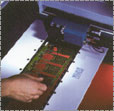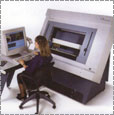|
Everett Charles Technolog-ies (ECT), headquartered in Pomona, California, is the leading manufacturer of testing equipment for bare circuit boards and of the test fixtures used to test populated boards.

 |
ECT is also the world’s top producer of spring probes—pins with internal springs allowing them to align with test points on a circuit board, thus enabling the board to be checked by a computerized tester.
In business since the ’60s, ECT has an impressive track record. Sales have now grown to about $100 million. With operations in the U.S., Europe and Asia, ECT has prospered not only through internal product development, but as a result of its acquisition of compatible businesses—10 small companies were added to its roster in the decade before it became a part of Dover.
Joining Dover Technologies as a stand-alone company in November 1996, ECT has continued to pursue an aggressive program of product and geographic expansion. In its first year as a Dover company, ECT purchased four additional businesses for a total of about $40 million. These acquisitions cemented the company’s position in its product market.
The Dover connection
ECT was not formally up for sale when its chief executive and principal shareholder, David R. Van Loan, first met Dover people in 1995. The company was doing exceptionally well, and Van Loan was heavily involved in developing new products and buying additional companies.
Van Loan had resisted
taking the company public because he recognized that he enjoyed product development and making acquisitions, but was less comfortable with maneuvering on Wall Street. He knew, however, that ECT would require major financial resources to continue its strong growth pattern. So, when ECT’s acquisition by Dover was proposed, Van Loan was at least willing to consider the idea.
Why Dover?
Van Loan and his shareholders agreed to sell ECT to Dover as the surest way to finance the company’s expansion without giving up any of its inherent strengths. Dover offered an entrepreneurial environment with access to large financial resources. Dover’s historical growth through acquisitions mirrored ECT’s own expansion history. Joining Dover would not mean being taken over by a meddlesome corporate empire with a dissimilar market outlook.
ECT would retain its name and corporate culture. Medical, vacation and other personnel policies, would all remain in place and continue to be managed at the company level.
The entrepreneurial spirit that fostered new ideas and pursued additional businesses would be encouraged to thrive and evolve. Nothing that had made ECT the company it was, would be lost.
Dover offered ECT the resources and environment that its management team needed to achieve its operating and growth objectives without having to relinquish the company’s autonomy or risk their net worth.
"We were able to cash out and still play in the game—at a potentially higher level," Van Loan says.
|